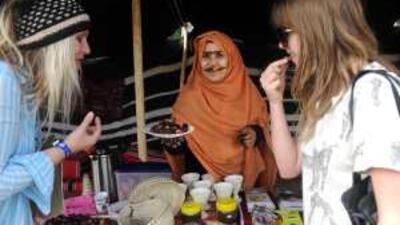ABU DHABI // The debut of a group of Emirati performers at one of the world's biggest music events was abruptly cancelled last night. The Kamal Musallam group - a collaboration between Kamal Musallam, the Jordanian jazz musician based in Dubai, and Sokoor al Magabeel, a group of Emirati folk dancers and percussionists - had been scheduled to take to the stage yesterday in front of an expected 35,000 people at Womad UK in Charlton Park, Wiltshire.
Their set, which they had been working on for three months, was also due to include a performance from the popular Dubai band, Abri. The performers claim that the Abu Dhabi Authority for Culture and Heritage (Adach) had agreed to meet their expenses for the trip and the performance. However, in a statement last night, Adach denied that it had ever entered into an agreement for the entertainers to participate in Womad UK.
"The only commitment we had," said Abdullah al Qubaisi, director of communications for Adach, "was for exchange of knowledge and experience in the form of workshops which represent our culture, including henna displays, UAE cooking and the promotion of the Womad event in Abu Dhabi. "There was no contract from the beginning for us to refuse at the last minute." In addition to the performance, the group recently completed a 12-track album, called Lulu (pearl in Arabic). As well as the 23 musicians, two sound engineers, three assistants and a photographer had expected to leave for Britain on Thursday morning.
The performance had been listed on the running list for Womad UK but were replaced with a group from India at the last minute. A workshop today at the festival has also been cancelled. Womad's director Chris Smith expressed surprise at the cancellation, particularly as five representatives from Abu Dhabi were already at the festival. "We are waiting for a statement or an explanation," he said. "We were looking forward to seeing Kamal Musallam and the others here. We would certainly like to know the reason for the cancellation."
Mr Smith added that he had seen the fusion group at Womad Abu Dhabi and thought the project was first rate and that he understood why they were disappointed. However, he said this would not affect the relationship between Womad and Adach, or the planned event next year. Adach also confirmed that the Womad 2010 festival in Abu Dhabi would go ahead. This year's event, the first, was held over three days on the public beach on the Corniche and was hailed as a huge success.
The free performances included world music stars such as Youssou N'Dour, Khaled, Mohamed Mounir and Robert Plant, the former singer with Led Zeppelin in a specially commissioned performance with Justin Adams and Juldah Camera. @Email:aseaman@thenational.ae

